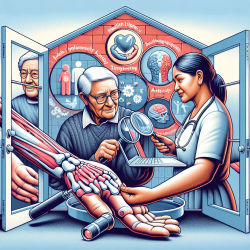Introduction
Arthritis, a prevalent chronic condition, affects millions worldwide, leading to pain and disability. A recent study published in PLoS ONE, titled "I don’t know what type of arthritis I have: A population-based comparison of people with arthritis who knew their specific type and those who didn’t," highlights a critical issue: many individuals with arthritis are unaware of their specific type. This lack of knowledge can significantly impact their access to appropriate care and management strategies.
Key Findings
The study analyzed data from the Survey on Living with Chronic Diseases in Canada, focusing on individuals diagnosed with arthritis. The participants were categorized into three groups: those who did not know their type of arthritis (DK), those with osteoarthritis (OA), and those with inflammatory and autoimmune types of arthritis (IAA).
Key findings include:
- 44.2% of participants did not know their type of arthritis.
- The DK group was more likely to be younger, have lower income and education levels, and belong to non-white cultural backgrounds.
- There were no significant differences in arthritis impact between the groups, but the DK group was less likely to have received information or used arthritis management strategies.
Implications for Practitioners
The study suggests that individuals in the DK group may have lower health literacy, impacting their ability to access and utilize healthcare services effectively. As practitioners, it is crucial to address this gap by:
- Improving communication: Ensure that patients understand their diagnosis and the importance of knowing their specific type of arthritis.
- Enhancing education: Provide accessible and comprehensive information about arthritis management strategies, tailored to different literacy levels.
- Facilitating access: Encourage the use of assistive devices and community resources to support self-management.
Encouraging Further Research
This study underscores the need for further research into the barriers preventing individuals from knowing their arthritis type. Understanding these barriers can help develop targeted interventions to improve health literacy and access to care. Practitioners are encouraged to engage in research initiatives and collaborate with organizations like TinyEYE to enhance patient outcomes.
Conclusion
Knowing one's type of arthritis is crucial for accessing appropriate care and managing symptoms effectively. By focusing on improving health literacy and communication, practitioners can play a vital role in enhancing the quality of life for individuals with arthritis. For those interested in delving deeper into the research, the original paper is available here.










